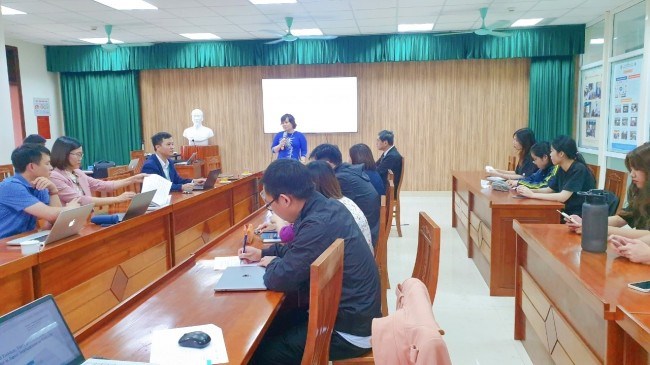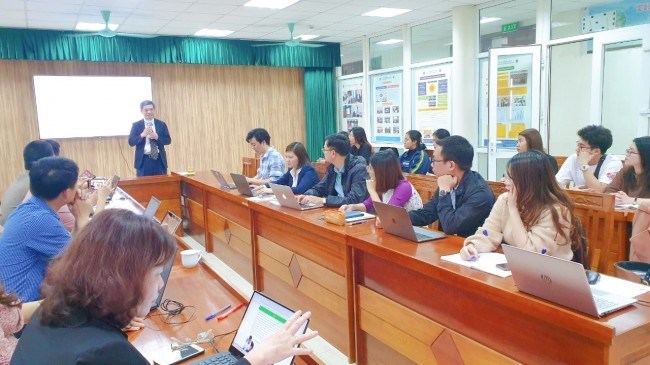Within the framework of Science - Technology cooperation and academic exchange, on March 7, 2023 at Room 405, Administration Building, the Specialization Research Group of Rural Development Management, Faculty of Economics and Rural Development (FERD), Vietnam National University of Agriculture (VNUA), organized a seminar with the theme “Food Problem, Farm Problem, and thereafter in Japan: Implications to Vietnam” presented by Professor Koichi Fujita from Aoyama Gakuin University, Japan.
Attending the Seminar were Assoc. Prof. Dr. Nguyen Thi Minh Hien, Dean of FERD, leader of the Specialization Research Group of Rural Development Management; Dr. Nguyen Huu Nhuan, Vice Dean of the Faculty; and a large number of staff, lecturers, researchers, and students from majors of Agricultural Economics, Financial Economics, Economics, Economic Management, and Rural Development.
    |
 |
| Assoc. Prof. Dr. Nguyen Thi Minh Hien delivers a speech to welcome experts |
The transition from “food problems” to “agriculture problems” is happening very quickly, which also implies that it is not easy for farmers to rapidly adapt to the new socioeconomic environment. Prof. Fujita's presentation aims to systematize the historical experiences of Japan and Asian countries in moving from food problems to agricultural problems, to draw some implications for the case of Vietnam.
    |
 |
| Prof. Fujita presents in front of nearly 40 lecturers and students from the Faculty |
In his presentation, Prof. Fujita gave an overview of the history of Japan's agricultural industry through a long period from the 16th, 17th centuries to after World War 2 and up to now; pointed out the achievements as well as the problems in Japanese agriculture in terms of food and agriculture as well as the consequences of those problems. Accordingly, in the early stages, especially after WW2, the food problem came from two main reasons: (1) population growth (at the early stage of economic development) during the “demographic transition”; and (2) the increase in per capita food consumption due to the shift of staple foods from low-quality food to high-grade food (In the case of Japan, from coarse grains to rice) and increased consumption of animal protein. These hadbecome serious problems that threaten the nation's food security.
However, the food problem quickly turned to the agricultural problem as per capita food consumption finally stabilized, or even began to decline. Population growth had also slowed down. The Engel coefficient (the ratio of food expenditures to total household expenditures) fell rapidly. This results in farmers' incomes remained unchanged (even decreasing), while incomes of non-farm groups increased rapidly. As a consequence, the income gap between the agricultural and non-agricultural sectors and between rural and urban areas increased rapidly.
Three main mechanisms to solve this problem in agriculture are (1) Expanding farm size in main food production (rice); Developing a market for land sale and/or lease; (2) Specialization in agriculture, creating products with high added value (livestock, horticulture, etc.); and (3) Abandon agriculture and switch to off-farm activities. The third solution is the main strategy but its implemention is not easy as it requires more investment in education and, thus, also takes time and over many generations.
    |
 |
| Prof. Fujita points out the difficulties in agricultural production in Japan |
Difficult problems related to agriculture such as low-income farmers, lack of social welfare programs, poor infrastructure in rural areas, and low labor productivity are the issues that the governments in Asia, including Vietnam, need to pay attention to. With similar characteristics in the village structure of Vietnam and Japan, the problems of agricultural production and the experiences (both positive and negative) that Japan experience in the process of agricultural development and rural areas are valuable lessons for Vietnam to refer to.
Also in the seminar, many questions related to agricultural and rural development were also discussed by teachers, researchers and students around issues that the two countries' agricultural industries had been, are and would have to face as well as the experiences and suggestions from Prof. Fujita for the future development of Vietnam's agriculture and rural areas.
    |
 |
| Delegates actively raise questions to Prof. Fujita |
The seminar ended in a friendly, sincere and meaningful atmosphere, bringing back good images and memories for Prof. Fujita about his working trip with the Faculty of Economics and Rural Development, VNUA, as well as new knowledge enriching the understanding for FERD’s lecturers and students, making teaching, research and learning of faculty, researchers and students more effective.